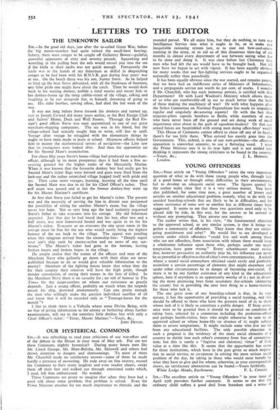OUR HYSTERICAL COMMONS
SIR,—It was refreshing to read your criticisms of our war-effort and of the debate in the House in your issue of May 9th. For are not these Commons slightly hysterical? During many hours men like Mr. Lloyd George, Mr. Hore-Belisha, Mr. Shinwell and others had drawn attention to dangers and shortcomings. To most of them Mr. Churchill made no satisfactory answer—some of them he made hardly a pretence of answering. He rode away on fine oratory, roused the Commons to their ready laughter and even readier cheers, swept them off their feet and walked out through emotional ranks which, I read, left him embarrassed. No wonder.
These Commons are prone to imagine that when they have had a good talk about some problem, that problem is solved. Even the Prime Minister attaches far too much importance to rhetoric and the
rounded period. We all enjoy him, but they do nothing, to turn our Intelligence Service into what it ought to be, or to make our inequitable rationing system just, or to root out bow-and-arrow training in the army, or to rid us of this disastrous time-lag of six months in almost every department of war between seeing what has to be done and doing it. It was clear before last Christmas that men who had left the sea would have to be brought back. Not till now have we begun to act with vigour. It has been equally obvious for many weeks that our fire-fighting services ought to be organised nationally rather than parochially.
It has been equally obvious since the war started, and remains patent, that we have had an indifferent series of Ministers of Information, and a propaganda service not worth 60 per cent, of marks. I wonder if Mr. Churchill, who has such immense powers, is satisfied with this Department? Or with Lord Woolton's Ministry which allows those of us who are comfortably-off t9 eat so much better than the bulk of those making the machinery of war? Or with what happens after the Select Committee on National Expenditure has made its singularly regular and singularly devastating reports? Or with the fact that sergeant-pilots captain bombers to Berlin while numbers of men who have never been off the ground and are doing work of small importance strut about in the garb of squadron-leaders? Or that our armed forces are besprinkled with strong men doing office-boys' work?
This House of Commons cannot afford to cheer off any of its head ; there's far too little there. What existed has mostly gone into the Government. This, indeed, is one of our root-problems—the effective opposition is somewhat anaemic, to use a flattering word. I trust the Prime Minister sees it in its true light and is not misled into thinking it represents the strong criticisms to be found in the country.






























 Previous page
Previous page